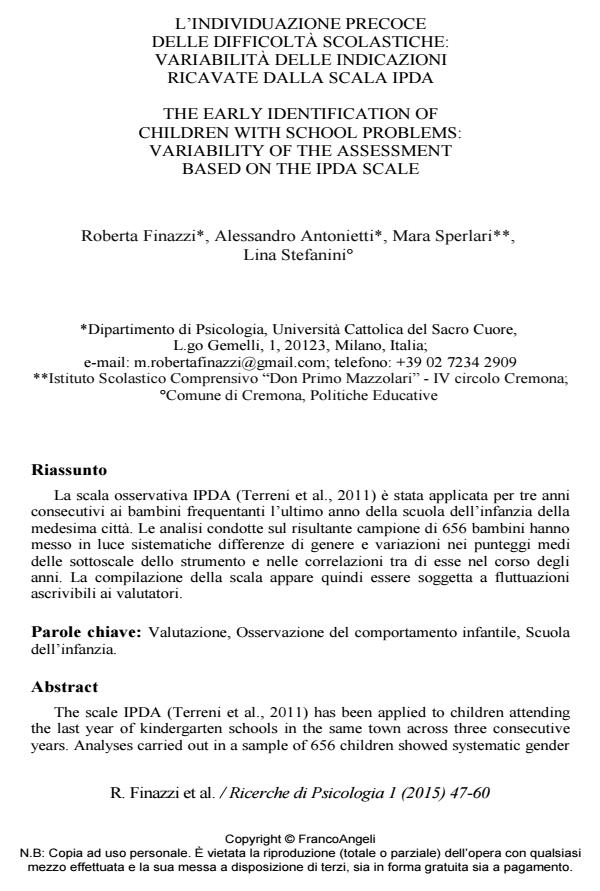The early identification of children with school problems: variability of the assessment based on the ipda scale
Journal title RICERCHE DI PSICOLOGIA
Author/s Roberta Finazzi, Alessandro Antonietti, Mara Sperlari, Lina Stefanini
Publishing Year 2015 Issue 2015/1 Language Italian
Pages 14 P. 47-60 File size 201 KB
DOI 10.3280/RIP2015-001002
DOI is like a bar code for intellectual property: to have more infomation
click here
Below, you can see the article first page
If you want to buy this article in PDF format, you can do it, following the instructions to buy download credits

FrancoAngeli is member of Publishers International Linking Association, Inc (PILA), a not-for-profit association which run the CrossRef service enabling links to and from online scholarly content.
The scale IPDA (Terreni et al., 2011) has been applied to children attending the last year of kindergarten schools in the same town across three consecutive years. Analyses carried out in a sample of 656 children showed systematic gender differences and variations in the means scores of the IPDA subscales, as well as in the patterns of correlations between subscales, across the years. The assessment based on IPDA appears to lack stability and to be dependent on evaluators.
Keywords: Assessment, Infant observation, Kindergarten school
- Antonietti, A., & Cantoia, M. (2010). Come si impara. Teorie, costrutti e procedure nella psicologia dell’apprendimento. Milano: Mondadori.
- Brooker, L. (2003). Learning how to learn: Parental ethnotheories and young children’s preparation for school. International Journal of Early Years Education, 11, 117-128.
- Carugati, F. (1990a). Everyday ideas, theoretical models and social representations: The case of intelligence and its development (pp. 130-150). In G.R. Semin
- & K.J. Gergen (Eds.), Everyday understanding: Social and scientific implications. Londra: Sage.
- Carugati, F. (1990b). From social cognition to social representations in the study of intelligence (126-143). In G. Duveen & B. Lloyd (Eds.), Social representations and the development of knowledge. Cambridge (MA): Cambridge University Press.
- Cornoldi, C. (2009). L’intelligenza. Bologna: il Mulino.
- Dweck, C.S., & Leggett, E.L. (1988). A social-cognitive approach to motivation and personality. Psychological Review, 95, 256-273.
- Dweck, C.S., Chiu, C., & Hong, Y. (1999). Implicit theories: Elaboration and extension of the model. Psychological Inquiry, 6, 322-333. Mugny, G., & Carugati, F. (1989). Social representations of intelligence. Cambridge (MA): Cambridge University Press.
- Poeschl, G., Doise, W., & Mugny, G. (1986). Les representations sociales de l’intelligence et de son developpement chez des jeunes de 15 a 22 ans. Educations et Recherches, 7, 75-94.
- Terreni, A., Tretti, M.L., Corcella, P.R., Cornoldi, C., & Tressoldi, P.E. (2011).
- IPDA - Questionario Osservativo per l’Identificazione Precoce delle Difficolta di Apprendimento. Trento: Erickson.
Roberta Finazzi, Alessandro Antonietti, Mara Sperlari, Lina Stefanini, L’individuazione precoce delle difficolta scolastiche: variabilita delle indicazioni ricavate dalla scala ipda in "RICERCHE DI PSICOLOGIA " 1/2015, pp 47-60, DOI: 10.3280/RIP2015-001002